Working to spread information about the lack of access to academic research, the Auburn University Libraries held events in accordance with International Open Access Week.
To Patricia Hartman, associate professor and subject librarian for biology, forestry and wildlife sciences and mathematics, the week reflects what she sees as the goal of libraries: to give people “access to the information they need.”
She described what she sees as a large problem with academic research. According to Hartman, government-funded research often gets locked behind a paywall, keeping people from information that should be freely accessible.
Responding to these concerns, a group of advocates joined together in 2008 to fight against paywalls and other forms of limiting access to research.
International Open Access Week, an annually celebrated event, came from those efforts. Universities across the globe now celebrate this week, all working toward making research more accessible. Auburn University joined this movement in 2022, when it held its first Open Access Week.
This week, the university held a series of events to educate the community about the lack of accessibility in academic research. The events began on Monday, Oct. 21, and ended on Thursday, Oct. 26.
On Monday, the library held two events. The first, presented by Andrew Whorley, discussed HathiTrust, an online database of historical documents to evaluate the changing nature of public information. The second, presented by Hartman, planned to discuss “mega-publishers” and the university’s role in academic publishing.
Tuesday, Hartman and Ali Krzton, assistant professor and research data management librarian, held a discussion regarding federal funding and open access. Topics planned for discussion included AUrora, the university’s open-access repository of academic work published by faculty, and the Nelson Memo, a recently published federal regulation outlining how federal agencies should create public access policies.
Hartman and Carrie Hill, assistant professor and digital scholarship librarian, set up an informative table at the intersection of Haley and Thach concourses Wednesday. They explained the open access movement to faculty and graduate students who stopped by.
Among other university initiatives, Hartman and Hill promoted ORCID, a digital nametag that distinguishes researchers from each other.
Hartman described a situation in which multiple researchers bearing the same name could be confused with one another. She said ORCID acts like a social security number, allowing people to easily find specific researcher’s published work.
Each ORCID, or Open Researcher and Contributor ID, is unique. No two scholars have the same identifying number, preventing mishaps Hartman described.
Also on Wednesday, the university hosted Rick Andersen, university librarian for Brigham Young University. His talk, which was held on Zoom, focused on the pros and cons of the open access movement.
The university ended the event with a screening of “Paywall: the Business of Scholarship” in the Caroline Marshall Draughon Auditorium Thursday afternoon. The documentary scrutinized the academic publishing industry, which it claimed had a 35% profit margin, far greater than many other industries.
As members of the university, Auburn students have access to sprawling databases of academic research. Yet for many, this information comes at a steep price. This inequality, which prompted the Open Access movement, has also led to what Hartman called the “democratization of information.”
At times, open access has been associated with negative connotations, according to Hartman. Yet, she and other advocates hope to dispel these myths. Hartman said people often confuse the movement with predatory publishing, a scheme that exploits the author-publisher relationship for monetary gain.
The Auburn University Libraries spend an upward of $5 million annually to provide students access to academic research, according to Hill. The public is often denied or limited access to the same information.
Like Hartman, Hill disagreed with the common practice of requiring paid access to government-funded research. To her, the practice of denying taxpayers access to research they helped pay for is “just wrong.”
Hill encouraged members of the Auburn community to stay mindful of their access to information and support the open access movement.
“Understand the privilege you have as an Auburn community member having access to things that we pay for through the library and take advantage of all those resources,” Hill said. “But also reflect on what you would do if you didn't have those [resources].”
Do you like this story? The Plainsman doesn't accept money from tuition or student fees, and we don't charge a subscription fee. But you can donate to support The Plainsman.
Connor Copeland, sophomore in English literature and philosophy, has been with The Auburn Plainsman since fall 2023.





